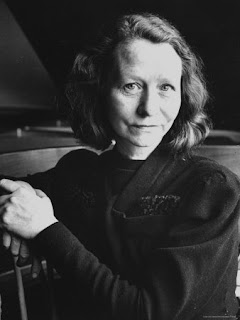Tuesday Poem: Being here, by Vincent O'Sullivan, New Zealand Poet Laureate
Tuesday Poem: Being here, by Vincent O'Sullivan, New Zealand Poe...:
It has to be a thin world surely if you ask for
an emblem at every turn, if you cannot see bees
arcing and mining the soft decaying galaxies
of the laden apricot tree without wanting
symbols – which of course are manifold – symbols
of so much else? What’s amiss with simply the huddle
and glut of bees, with those fuzzed globes
by the hundred and the clipped out sky
beyond them and the leaves that are black
if you angle the sun directly behind them,
being themselves, for themselves? I hold out
my palms like the opened pages of a book
and you pile apricots on them stacked three
deep, we ask just who can we give them to
round here who hasn’t had their whack of apricots
as it is? And I let my hands tilt and the plastic
bag that you hold rustles and plumps with their
rush, I hold one back and bite into it and its
taste is the taste of the colour exactly, and this
hour precisely, and memory I expect is storing
for an afternoon far removed from here
when the warm furred almost weightlessness
of the fruit I hold might very well be a symbol
of what’s lost and we keep wanting, which after
all is to crave the real, the branches cutting
across the sun, your standing there while I tell you,
‘Come on, you have to try one!’, and you do,
and the clamour of bees goes on above us, ‘This
will do’, both of us saying, ‘like this, being here!’
From Further Convictions Pending: Poems 1998–2008 by Vincent O’Sullivan. Posted with permission.
Helen McKinley has posted this on the Tuesday Poem website and I wanted to share it because it's so good. The second half of the blog is an interview with Vincent Sullivan - very well worth reading. This is one of my favourite quotes.
'Some very good poets, like Robert Graves, insist that the least a poem should do is to make good prose sense. Others think quite the contrary – Wallace Stevens’ remark, for example, that ‘poetry should resist the intelligence almost successfully.’ The overarching fact of poetry is that it offers a swathe of possibilities, from total clarity to the most elusive symbolism. There’s no obligation to admire every kind of poetry, and there’ll always be enough of what we do care for us not to fret about what we don’t.'
If you'd like to read the whole interview you can do so here. . . . .
It has to be a thin world surely if you ask for
an emblem at every turn, if you cannot see bees
arcing and mining the soft decaying galaxies
of the laden apricot tree without wanting
symbols – which of course are manifold – symbols
of so much else? What’s amiss with simply the huddle
and glut of bees, with those fuzzed globes
by the hundred and the clipped out sky
beyond them and the leaves that are black
if you angle the sun directly behind them,
being themselves, for themselves? I hold out
my palms like the opened pages of a book
and you pile apricots on them stacked three
deep, we ask just who can we give them to
round here who hasn’t had their whack of apricots
as it is? And I let my hands tilt and the plastic
bag that you hold rustles and plumps with their
rush, I hold one back and bite into it and its
taste is the taste of the colour exactly, and this
hour precisely, and memory I expect is storing
for an afternoon far removed from here
when the warm furred almost weightlessness
of the fruit I hold might very well be a symbol
of what’s lost and we keep wanting, which after
all is to crave the real, the branches cutting
across the sun, your standing there while I tell you,
‘Come on, you have to try one!’, and you do,
and the clamour of bees goes on above us, ‘This
will do’, both of us saying, ‘like this, being here!’
From Further Convictions Pending: Poems 1998–2008 by Vincent O’Sullivan. Posted with permission.
'Some very good poets, like Robert Graves, insist that the least a poem should do is to make good prose sense. Others think quite the contrary – Wallace Stevens’ remark, for example, that ‘poetry should resist the intelligence almost successfully.’ The overarching fact of poetry is that it offers a swathe of possibilities, from total clarity to the most elusive symbolism. There’s no obligation to admire every kind of poetry, and there’ll always be enough of what we do care for us not to fret about what we don’t.'
If you'd like to read the whole interview you can do so here. . . . .


Comments
Post a Comment